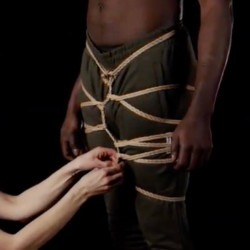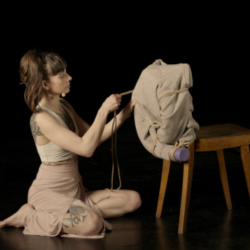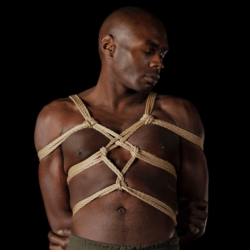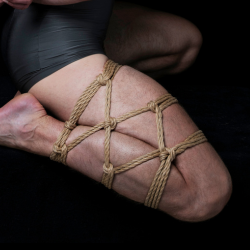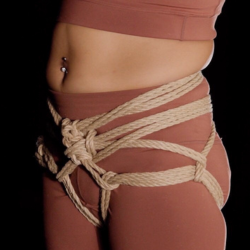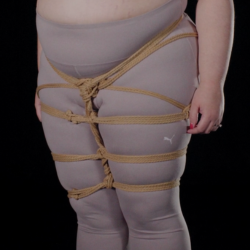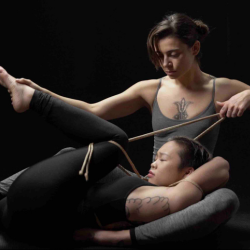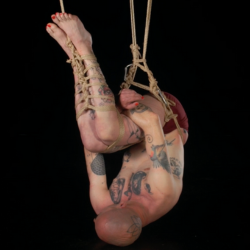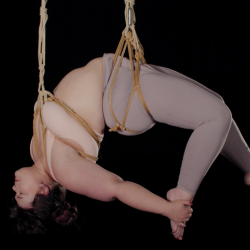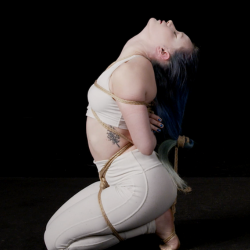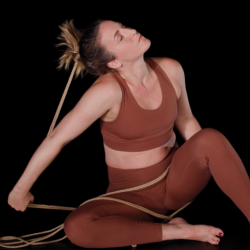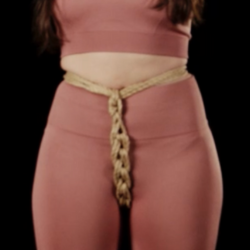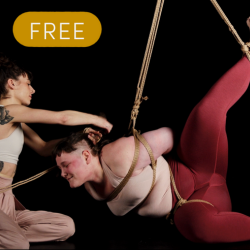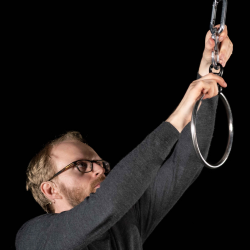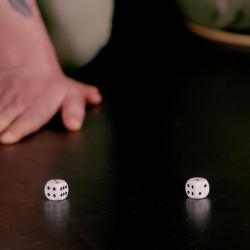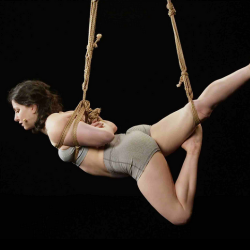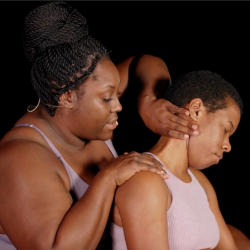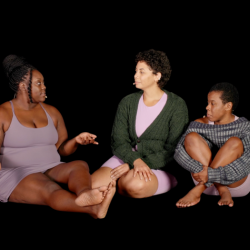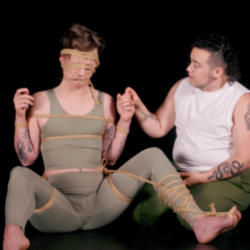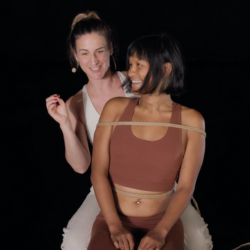ALL EPISODES

Rope isn't just about knots—it's about connection, emotion, and the art of shared vulnerability. In this episode, Davide journey of finding purpose in rope, balancing aesthetics and safety, and embracing growth through introspection.

"Every good story starts with a hardware store." Sparks shares his journey into shibari, from learning rope with his wife to studying under Kanna. He explores communication, consent, emotional connection, and creative sadism, offering personal insights into building meaningful rope experiences.

Lavender emphasizes breaking down barriers by sharing knowledge and creating inclusive spaces. She explores her journey into kink and rope, the value of emotional connection, dismantling gatekeeping, and building community through intentionality and shared experiences.

Gandalf discusses their unique approach to rope, exploring themes of memory, vulnerability, and connection. They share insights on teaching, the emotional impact of touch, and creating spaces for authenticity and intentionality in rope practice.

"Rope should be taught as a series of decisions rather than patterns," Hitchin Kitten suggests, emphasizing dynamic choices over rigid forms. In this episode, they discuss playful, movement-centered rope, grounding in intuition, and fostering inclusive, identity-based communities.

Devon and Cass discuss their evolving experiences with rope bondage, chronic pain, and navigating personal trauma. They explore communication, consent, and collaboration in kink, offering insights into how pain and power dynamics shape their connection both on and off stage.

"I can't wait to learn what my rope style is!" Axel discusses her journey into kink, navigating whitewashed kink spaces, the emotional depth of rope bottoming, and the personal growth she’s experienced through self-tying and exploring the intersection of mental health and kink.

Good relationships are all about connection. Wren and Yana dive into the nuances of fulfilling intimacy, consent, and navigating dynamics in relationships. They discuss overcoming personal hang-ups, redefining pleasure, and the importance of open communication in both kink and vanilla spaces.

No one's ever died from futo! Shay Tiziano discusses transitioning from LARPing to kink, exhibitionism, incorporating camp into performances, and the importance of active bottoming. They also cover event production, teaching rope, and their upcoming book.

Wren and Loom delve into the complexities of Shibari, exploring Loom's evolution from technical proficiency to prioritizing art and meaningful connection. They discuss the ego death brought on by COVID, and the challenge of balancing artistry with authentic human interaction in rope practice.

Let’s learn the rules, then create ties. Beatrice shares her journey from shibari educator to relationship coach, exploring how to navigate relationship dynamics, challenge traditional roles, and harness the transformative power of open communication in kink and beyond.

According to Oji Pan, it’s essential to give people the space to authentically manifest their values. In this episode, Oji Pan discusses the art of rope, its history, and the challenges men face in expressing vulnerability. He also highlights the Devil Mask Society’s inclusive approach, exploring themes of shame, ego, and deeper connections through rope practice.

One of Ivy's mission is to give people the freedom to find out who they are in rope. Join Ivy Limieux as they share their kink journey, explore community inclusivity, and discuss challenges faced by marginalized groups in alternative spaces. Gain insights on creating welcoming environments and fostering genuine connections.

Leading questions prime the person being asked to agree! Melissa aka. GoodMostTimes chats about active bottoming, the importance of reflection and feedback for rope bottoms, and the challenges in class settings. She also talks about the opening of Devil Mask Studio in Los Angeles.

Emphasizing authenticity over universal appeal, Fox and Mya aim to attract like-minded listeners who appreciate their genuine approach. Together, they share their rope journey with us, discussing the challenges of producing their long-running podcast, the balance between creativity and consistency, and their insights on integrating values and philosophy into their practice.

It's actually a crossing knot, not a Munter hitch! In this episode, Natalie Rose discusses their rope journey, the dynamics of being in a property-owner relationship, and the significance of communication and platonic kink in their practice.

Colette Pervette's mission is to eradicate shame and teach people how to play again. In this episode, they dive into kink, ego dissolution, and intentional play, highlighting negotiation tips and the importance of curiosity in BDSM.

Embrace the unexpected with Shannonagannery! Host Wicked Wren explores Shannon's 'yes, and' approach to life, discussing authenticity, joy, and creativity in kink. In this episode, the playful integration of clowning, negotiation, and the pursuit of genuine happiness are highlighted.

Jake and Laced, also known as Nawa Musubi, discuss their approach to shibari and teaching philosophies. They emphasize the importance of communication and adaptation in their practice, highlighting personal growth, inclusivity, and the evolving recognition of models in the community.

Join Vex Murmur as they shares their journey from Mormon upbringing to rope bondage, highlighting artistic expression, technical challenges, and self-care in self-suspension. They stress self-awareness, communication, and starting with floor work for safe exploration, promoting individualized approaches.

Mx Bliss explores their switch identity, the dynamics of rope play, and the challenges of navigating legal gray areas. The conversation emphasizes diversity, embracing fears, and advocating for mainstream acceptance.

Mistress Gemma Li navigates a labyrinth of topics, from her disdain for celery to the depths of BDSM psychology. Explore her journey from academia to domination, as she emphasizes communication and hands-on experience in the evolving realm of kink education.

Bimbo Daddy Lu has been an involved community member in the greater Los Angeles area since 2017. Dabbling in everything from bottoming, topping, sex work and adult entertainment production. They strive to make space for marginalized folks and give back to the rope community as much as possible.
Instagram: @bimboxdaddy

Kata discusses their journey into shibari, blending spirituality and bodywork. They reflect on fostering community, challenges of organizing workshops, and the intersection of rope bondage with Tantra. Kata emphasizes mindfulness, presence, and ongoing self-improvement.

Liquid's advice: Respect your own boundaries. Their exploration of their BDSM journey emphasizes the pillars of education, consent, and accountability, advocating for inclusivity and understanding through personal anecdotes within the community.

Malachi, a switch in kink practices, emphasizes safety, negotiation, and self-advocacy in BDSM. They discuss rope experiences, nerve checks, and body perception, highlighting the emotional significance of self-suspension and the role of photography in self-discovery.

Massokissed discusses veganism, art, and rope bondage. Through photography and rope, she explores creativity, challenges, and emotional processing, aiming to create safe spaces for models and liberate sexuality.

HeatHawk shares their journey from discovering kink in Tucson to embracing vulnerability and pushing boundaries through rope bondage.

Barbieland is like the dungeon where women are in charge. Explore the life of a pro domme with Mistress Hera as she discusses the importance of consent, vetting clients and her own unique experiences.

subRobert explores online presence, BDSM communication, and integrating kink into daily life. Sharing journey insights and the impact of Mistress Neena, the lively discussion offers a glimpse into the world of BDSM and subRobert's unique experiences.

Amid playful banter about burgers and cat poems, Shira Ties delves into body positivity, societal acceptance, and the emotional intricacies of rope play.

Exploring the intricacies of rope, intimacy, and online censorship, Ebibex's discussion intertwines the art of capturing intimate moments through photography with thought-provoking reflections on the complexities of social media restrictions.

In this episode, Ordinals discusses their involvement with Devil Mask Society and what community-driven, democratized rope education could look like. As a rope educator, their primary goal is to become obsolete, aspiring for a world where access to learning isn't for the privileged few. Their message? Visibility breeds possibility!

Get ready for an electrifying podcast episode as Nick delves into various subjects, from the thrill of rope bombing and outdoor tying to the intersection of rope and photography and the creativity within constraints.

In this episode, Dancehalldyke (she/they) aka Kit and slab_me_harder (she/her) aka Juliette draw parallels between the risks of backcountry skiing and rope play, emphasizing the crucial roles of negotiation and debriefing in managing these risks and building trust.

In this episode, Émile, also known as Ecchimoz, a rope enthusiast and self-proclaimed "monster," opens up about his journey in the world of shibari. He discusses his personal evolution, the mind games he plays with his partners, and the profound impact of trust and vulnerability in his ties.

In this episode, Mr. Goat and Madalimne discuss their journey into rope bondage and their exploration of pain and sadism within it.

In this episode, Ashley Ray delves into the world of rope bondage, emphasizing its connection to human psychology and vulnerability. They demystify the concept of subspace and highlight the importance of accountability within the kink community.

To feed or not to feed the machine? In this captivating podcast episode, Miss Marilyn and Wicked Wren engage in a candid conversation that spans various aspects of their lives, beyond the realm of sex work and social media.

DK Blackfish shares how they embraced their identity inspired by the documentary "Blackfish" and discusses their rope journey. Their bottom-up approach includes models reaching out to them and a trauma-informed negotiation process.

In this lively episode, Wren chats with Anoxia Rope, who shares their hilarious adventure of using spaghetti in rope play with friends. Get ready for laughs and heartwarming insights into Anoxia Rope's passion for rope bondage.

Principle over pattern! This is Mo's mantra as he sits down with Wren and reflects on his 13 years of doing rope, exploring the significance of the journey over specific end goals and the importance of building a strong, supportive community on the Shibari Study Discord.

In this episode, Mistress Kiko shares her story and kink journey. Together with Wren, they explore her job as a pro domme and talk about some of her sessions.

In this episode, Knotty Devil talks about how religion shaped his youth and discusses his approach to rope. He encourages people to tie for flow and break their movements down into how they're connected to the person they're tying.

With emphasis on ethical negotiation, Twisted Lily focuses on the importance of exploring different rope techniques and style, while also discussing the possible limitations there are to categorizing rope styles.

In this episode, The Silence shares his photography journey and unveils some secrets to learning how to capture amazing images.

Kazami Ranki talks about how he learned to tie and what keeps him going for more than 25 years as a rope artist while sharing some insight into his teachings.

In this episode, Wren and Tom talk about the parallels between poker and rope bondage and how it impacted his negotiation process.

There’s micro-bondage and then there’s micro-bondage… Rigged Threads is an embroidery artist who translates all the complexity of Shibari into miniature!

In this episode, Cam Damage and Wren chat about personal journeys and rope journeys, where they intersect and where they diverge.

Get ready for an electrifying podcast episode as Nick delves into various subjects, from the thrill of rope bombing and outdoor tying to the intersection of rope and photography and the creativity within constraints.

In this episode, Wren and Fuoco discuss a bottom's responsibility, a community's accountability, and tangible bottoming skills.

Invaluable tips on consent, switchy rope relationships, exhibitionism and queer rope community.

In this episode, Wren and Ms. Reemah dive into the intersections of kink, psychology and trauma.

In this episode, KissMeDeadlyDoll (KMDD) talks about self-tying, early fantasies, her passion for creating kink-related content and more.

Join the founders of Shibari Study as they share intimate insights of themselves, the company's origin story, and their visions for the future.
Start your free 7-day trial
Get one free week of unlimited access at Shibari Study,
then pay from $17.90/month. Cancel anytime.


